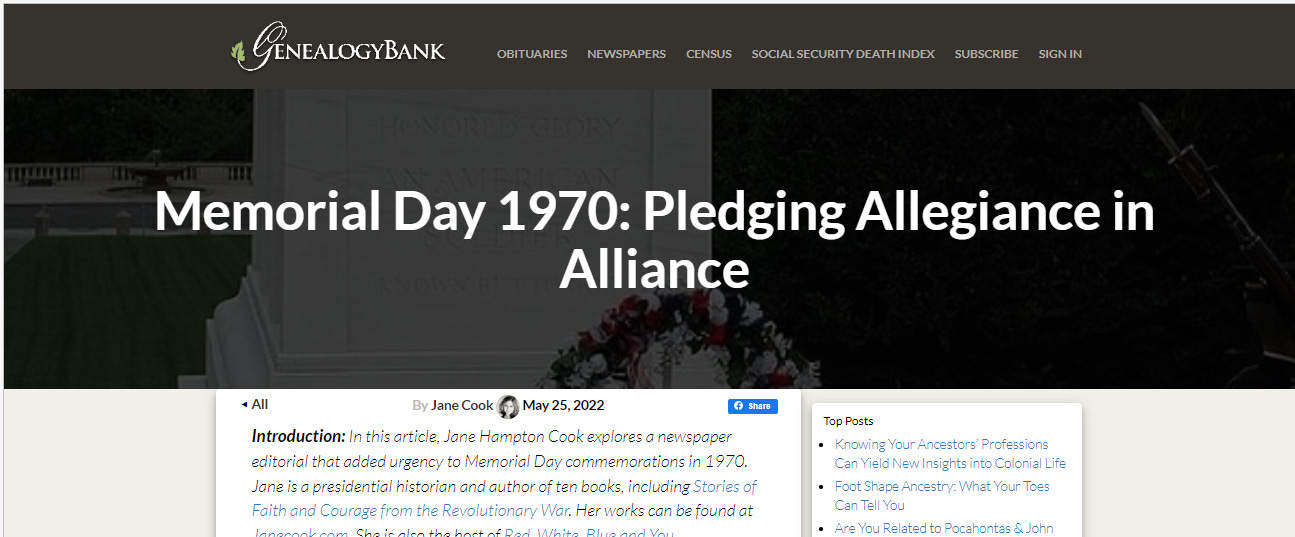Memorial Day- The Fear of Being Forgotten
Jane Hampton Cook gives commentary on two Memorial Day articles she wrote for GeologyBank.com.

In addition to my substack on John Adams and the congregation of the dead, I wrote two articles for Memorial Day for the non-political GenealogyBank.com, which is a fabulous database of historical newspapers.
Over the years, historical newspapers have given me unique context and points of view for the people and events that I have featured in my books and articles, whether it's the burning of the White House or the true crime propaganda and disinformation campaign targeting General George Washington, which is the subject of my upcoming book, War of Lies.
In searching “Memorial Day” on GenealogyBank.com, thousands of hits, of course, come up. But a few articles caught my attention for different reasons yet, as it turned out, they each conveyed a similar idea: the fear of being forgotten.
After the Civil War, both Northerners and Southerners set aside different days in their states and communities to honor their war dead.
What I discovered is that by the 1890s, veterans on both sides were expressing the same concern: the fear of being forgotten.
As men who had fought in the Civil War in their teens and 20s and had now reached their 50s, they were afraid that future generations would forget the sacrifice of those who had died next to them on battlefields of Gettysburg, Vicksburg and beyond. They had survived and didn't want to forget their deceased brothers in arms.
For example, a Civil War veteran in Mississippi in 1897 feared that “jollification” was taking over Memorial Day events and the meaning behind the holiday would soon be obsolete.
“Shall Memorial Day be relegated into obscurity, becoming itself only a memory?”
This Mississippian recommended that a Sunday be set aside for Memorial Day, so that commemorations could be tied to church services, which would uphold the reverence of the occasion.
Likewise, Minnesota Civil War veterans expressed similar sentiments at their annual reunions and made recommendations to hold decoration days of memorial at schools and to teach children patriotic songs. Their efforts paid off. After all, this era gave birth to the pledge of allegiance to the flag.
Another historical newspaper article also caught my attention. An editorial in a newspaper in Alliance, Ohio, in 1970 really stood out to me because of its urgency. This veteran writer desperately urged Ohioans to attend Memorial Day festivities. His tone was as if America's survival depended on it.
“There’s truth in the statement that joining in the Memorial Day observance ‘may be the most important thing you do in your lifetime.’”
This made me wonder. What had happened in May 1970 in Ohio to express such strong sentiment about Memorial Day? What had led him to also declare:
“Because of the insidious trends apparent in some segments of American society, and because American traditions have been attacked as out-of-step in the present-day world, aroused Alliance citizens are leading the way in encouraging Memorial Day participation.”
My GenealogyBank article reveals the specific event that had aroused this writer's fears, which also resonates with tragic events the past few weeks.
By 1970, opposition to the Vietnam War and other cultural clashes had led World War II veterans to the same place as the Civil War veterans: the fear that future Americans would forget the war dead, the sacrifice of those Americans who had died fighting totalitarianism in Europe and Japan, and the value of patriotism. They feared the loss of America itself.
What does all of this mean for today? The threats against Americans today are numerous: open borders, racism and critical race theory as well as religious discrimination in the U.S. Military, election integrity, censorship, and dangerous, creepy totalitarian surveillance threats from the World Economic Forum that openly discuss tracking and tracing all individuals through digital passports.
None of these problems have easy human solutions. But Memorial Day reminds us that we have a responsibility to remember the sacrifices of those who died for us. We have a responsibility to pass along patriotism to future generations. We have a responsibility to count the cost of freedom.
Behind each of the nameless numbers listed below is an American who paid the ultimate sacrifice, a person we collectively remember on Memorial Day.
Total U.S. Military Fatalities by War
American Civil War (1861-65) 620,000
World War II (1939-45) 405,399
World War I (1917-18) 116,516
Vietnam War (1965-1973) 58,209
Korean War (1950-53) 36,516
American Revolutionary War (1775-83) 25,000
War of 1812 (1812-1815) 20,000
Mexican-American War (1846-48) 13,283
War on Terror** (2001-present) 7,075
Spanish American War (1898) 2,446
Gulf War (1990-91) 258
Jane Hampton Cook’s books by war:
Stories of Faith and Courage from the War in Iraq and Afghanistan
Stories of Faith and Courage from the Revolutionary War
(The Stories of Faith and Courage books are part of the Battlefields and Blessings series, which includes WWII, Vietnam, the Civil War and others on Amazon.)
The Burning of the White House: James and Dolley Madison and the War of 1812
American Phoenix: John Quincy and Louisa Adams (the international side of the War of 1812)
America's Star-Spangled Story (War of 1812)





